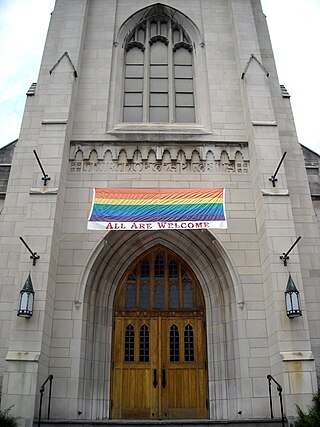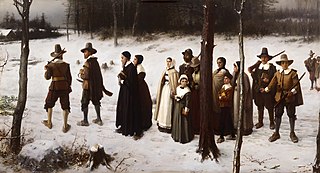Within Christianity, there are a variety of views on sexual orientation and homosexuality. The view that various Bible passages speak of homosexuality as immoral or sinful emerged through its interpretation and has since become entrenched in many Christian denominations through church doctrine and the wording of various translations of the Bible.
Evangelicalism, also called evangelical Christianity or evangelical Protestantism, is a worldwide interdenominational movement within Protestant Christianity that puts primary emphasis on evangelization. The word evangelic comes from the Greek word for 'good news'. The Gospel story of the salvation from sin is considered "the good news". The process of personal conversion involves complete surrender to Jesus Christ. The conversion process is authoritatively guided by the Bible, the God in Christianity's revelation to humanity. Critics of the conceptualization of evangelicalism argue that it is too broad, too diverse, or too ill-defined to be adequately seen as a movement or a single movement.
Christian fundamentalism, also known as fundamental Christianity or fundamentalist Christianity, is a religious movement emphasizing biblical literalism. In its modern form, it began in the late 19th and early 20th centuries among British and American Protestants as a reaction to theological liberalism and cultural modernism. Fundamentalists argued that 19th-century modernist theologians had misunderstood or rejected certain doctrines, especially biblical inerrancy, which they considered the fundamentals of the Christian faith.

Evangelism or witnessing is the act of preaching the Christian gospel with the intention of sharing the message and teachings of Jesus Christ. It is sometimes associated with Christian missions.

The mainline Protestant churches are a group of Protestant denominations in the United States and Canada largely of the theologically liberal or theologically progressive persuasion that contrast in history and practice with the largely theologically conservative evangelical, fundamentalist, charismatic, confessional, Confessing Movement, historically Black church, and Global South Protestant denominations and congregations. Some make a distinction between "mainline" and "oldline", with the former referring only to denominational ties and the latter referring to church lineage, prestige and influence. However, this distinction has largely been lost to history and the terms are now nearly synonymous.

Progressive Christianity represents a postmodern theological approach, which developed out of the liberal Christianity of the modern era, itself rooted in the Enlightenment's thinking. Progressive Christianity is a postliberal theological movement within Christianity that, in the words of Reverend Roger Wolsey, "seeks to reform the faith via the insights of post-modernism and a reclaiming of the truth beyond the verifiable historicity and factuality of the passages in the Bible by affirming the truths within the stories that may not have actually happened."

John Smyth was an English Anglican, Baptist, then Mennonite minister and a defender of the principle of religious liberty.
The Evangelical left is a Christian left movement in Evangelical Christianity that affirms conservative evangelical theology and are politically progressive. It is mainly based in the US, but is also found in Latin America.
The historical-grammatical method is a modern Christian hermeneutical method that strives to discover the biblical authors' original intended meaning in the text. According to the historical-grammatical method, if based on an analysis of the grammatical style of a passage, it appears that the author intended to convey an account of events that actually happened, then the text should be taken as representing history; passages should only be interpreted symbolically, poetically, or allegorically if to the best of our understanding, that is what the writer intended to convey to the original audience. It is the primary method of interpretation for many conservative Protestant exegetes who reject the historical-critical method to various degrees, in contrast to the overwhelming reliance on historical-critical interpretation in biblical studies at the academic level.
Conservative Christianity, also known as conservative theology, theological conservatism, traditional Christianity, or biblical orthodoxy is a grouping of overlapping and denominationally diverse theological movements within Christianity that seeks to retain the orthodox and long-standing traditions and beliefs of Christianity. It is contrasted with Liberal Christianity and Progressive Christianity, which are seen as heretical heterodoxies by theological conservatives. Conservative Christianity should not be mistaken as being necessarily synonymous with the political philosophy of conservatism, nor the Christian right.
A Bible college, sometimes referred to as a Bible institute or theological institute or theological seminary, is an evangelical Christian or Restoration Movement Christian institution of higher education which prepares students for Christian ministry with theological education, Biblical studies and practical ministry training.
The Republican Federation was the largest conservative party during the French Third Republic, gathering together the progressive Orléanists rallied to the Republic.
A profession of faith is a personal and public statement of a belief or faith.

Protestantism is the largest grouping of Christians in the United States, with its combined denominations collectively comprising about 43% of the country's population in 2019. Other estimates suggest that 48.5% of the U.S. population is Protestant. Simultaneously, this corresponds to around 20% of the world's total Protestant population. The U.S. contains the largest Protestant population of any country in the world. Baptists comprise about one-third of American Protestants. The Southern Baptist Convention is the largest single Protestant denomination in the U.S., comprising one-tenth of American Protestants. Twelve of the original Thirteen Colonies were Protestant, with only Maryland having a sizable Catholic population due to Lord Baltimore's religious tolerance.

The Heritage College & Seminary is a Baptist theological institute in Cambridge, Ontario, Canada. It is affiliated with the Fellowship of Evangelical Baptist Churches in Canada.

In the United States, evangelicalism is a movement among Protestant Christians who believe in the necessity of being born again, emphasize the importance of evangelism, and affirm traditional Protestant teachings on the authority as well as the historicity of the Bible. Comprising nearly a quarter of the U.S. population, evangelicals are a diverse group drawn from a variety of backgrounds, including nondenominational churches, Pentecostal, Baptist, Reformed, Methodist, Mennonite, Plymouth Brethren, and Quaker.
The believers' Church is a theological doctrine of Evangelical Christianity which teaches that one becomes a member of the Church by new birth and profession of faith. Adherence to this doctrine is a common defining feature of an Evangelical Christian church.
The offering in Christianity is a gift of money to the Church.
Evangelical theology is the teaching and doctrine that relates to spiritual matters in evangelical Christianity and a Christian theology. The main points concern the place of the Bible, the Trinity, worship, salvation, sanctification, charity, evangelism and the end of time.
The Federation of Evangelical Baptist Churches of France is Baptist Christian denomination in France. It is affiliated with the National Council of Evangelicals of France and the Baptist World Alliance. The headquarters is in Paris.






